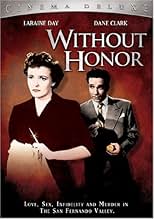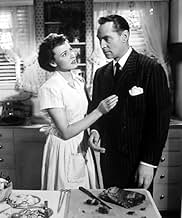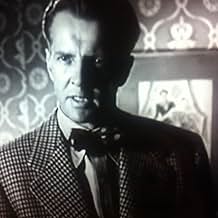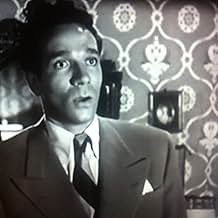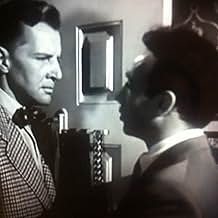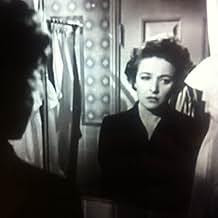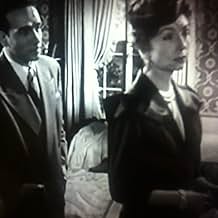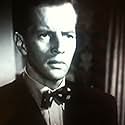Füge eine Handlung in deiner Sprache hinzuJane Bandle has recently married, but Bill, her husband's brother, tries to wreck her marriage because Jane rejected his sexual advances before her marriage.Jane Bandle has recently married, but Bill, her husband's brother, tries to wreck her marriage because Jane rejected his sexual advances before her marriage.Jane Bandle has recently married, but Bill, her husband's brother, tries to wreck her marriage because Jane rejected his sexual advances before her marriage.
- Auszeichnungen
- 1 Nominierung insgesamt
Marjorie Stapp
- Neighbor's Wife
- (as Margie Stapp)
Irving Pichel
- Narrator
- (Synchronisation)
- (Nicht genannt)
Empfohlene Bewertungen
Without Honor is directed by Irving Pichel and written by James Pope. It stars Dane Clark, Laraine Day, Franchot Tone and Agnes Moorehead. Music is by Max Steiner and cinematography by Lionel Lindon.
A mixed bag on offer in this one, where a broth of "sins" is stirred suitably in predominantly one location. Set-up bares a striking resemblance to Hitchcock's Rope released the previous year, where a group of characters are thrust together in one living room deconstructing their sins, shattered dreams and ulterior motives - all while a supposed dead body lays prone in one of the bedrooms.
The thematics at work are prime film noir, adultery, suicide attempt, sexual aggression, jealous agenda, duping and etc, all of which only comes to life half way through the piece. Here in is the problem, the pic asks for a lot of patience from the viewer before really getting going, which although the character group dynamic is pungent with an unsavoury odour, it never fully gets out of first gear.
Things aren't helped by the flat visual look of the piece, where with the story set in daytime, we yearn for a bit of noir flourish from one of the ace noir photographers of the time. Then there's Steiner's score, which is a cracker, ebullience in abundance, only it's in the wrong film! Moorehead is wasted in what is ultimately a walk on passive role, but at least Clark and Day nail the traits of their respective characters.
No hidden gem here, and noir hunters should be advised this is only noir from a plot perspective, but enough damaged human conditioning here to make it above average. 6.5/10
A mixed bag on offer in this one, where a broth of "sins" is stirred suitably in predominantly one location. Set-up bares a striking resemblance to Hitchcock's Rope released the previous year, where a group of characters are thrust together in one living room deconstructing their sins, shattered dreams and ulterior motives - all while a supposed dead body lays prone in one of the bedrooms.
The thematics at work are prime film noir, adultery, suicide attempt, sexual aggression, jealous agenda, duping and etc, all of which only comes to life half way through the piece. Here in is the problem, the pic asks for a lot of patience from the viewer before really getting going, which although the character group dynamic is pungent with an unsavoury odour, it never fully gets out of first gear.
Things aren't helped by the flat visual look of the piece, where with the story set in daytime, we yearn for a bit of noir flourish from one of the ace noir photographers of the time. Then there's Steiner's score, which is a cracker, ebullience in abundance, only it's in the wrong film! Moorehead is wasted in what is ultimately a walk on passive role, but at least Clark and Day nail the traits of their respective characters.
No hidden gem here, and noir hunters should be advised this is only noir from a plot perspective, but enough damaged human conditioning here to make it above average. 6.5/10
I saw this when I was 10, when movies were double features and the fare changed weekly. I only remembered it because I loved Day, not because of being an actress, but because she was Leo Durocher's wife and I was a Baseball nut. I saw it again recently on TCM. This movie defies a reason for being, except that the studios needed constant fodder and this film proves the point that it was often volume over content. We are still being crammed with movies that ask the same question, What Were They Thinking, but lack the old excuse.
Day's acting, consisting primarily from 'reacting', is an embarrassment on the same footing as the unlikely dialogue given to the rest of the cast. Her opening scene with Clark makes for great comedy as she goes thru a 360 degree range of reactions to his 25 or so separate avenues of dialogue, mostly questions she never answers. And he's oblivious to the strangeness of her conduct. From there it only gets worse.
It's hard to believe it's the same Day who shown so brilliantly in Mr. Lucky or a movie with such confusing plot turns, but unlike The Big Sleep, where you didn't notice or care.
Day's acting, consisting primarily from 'reacting', is an embarrassment on the same footing as the unlikely dialogue given to the rest of the cast. Her opening scene with Clark makes for great comedy as she goes thru a 360 degree range of reactions to his 25 or so separate avenues of dialogue, mostly questions she never answers. And he's oblivious to the strangeness of her conduct. From there it only gets worse.
It's hard to believe it's the same Day who shown so brilliantly in Mr. Lucky or a movie with such confusing plot turns, but unlike The Big Sleep, where you didn't notice or care.
Without Honor is a 1949 film directed by Irving Pichel and starring Laraine Day as an adulterous housewife in the Los Angeles burbs who has a sort of intervention conducted by her psychotic brother-in-law (Dane Clark) because he's getting even for spurning him and marrying his brother years before.
He arranges for Day and his brother (Bruce Bennett) to be home when Day's lover (Franchot Tone) and his wife (Agnes Moorehead) drop by so he can expose her and get his revenge. Just another sunny day in the burbs.
What Clark doesn't know is that earlier that afternoon Day and Tone had a big fight and break-up and when Day tried to kill herself with a shish-kabob skewer he accidentally fell on it while wrestling it away from her and stabbed himself to death. He's in the laundry room on the floor.
When Clark arrives, he taunts Day, who is about to skip out in a taxi. He goes on and on about how she got him drunk on beers when he was 18 and he made a fool of himself and he's never gotten over it. Day has other things on her mind. Moorehead shows up with no idea why she's there. Bennett comes home from work. Tone is a no-show.
Moorehead has a chat with Day and tells her she knows all about it ... and all his previous dalliances. Bennett pitches a fit, so Day runs into the bathroom and tries to slice her wrists with a razor blade. They call an ambulance but by then they discover that Tone isn't in the laundry room. Keep that ambulance a-comin'.
Everyone in the cast is quite good even if the film is a tad over-the-top. Certainly an interesting post-war take on placid suburbia. Gorgeous cars! Tone drives a 1948 Studebaker convertible and Moorehead drives a 1948 Packard sedan.
He arranges for Day and his brother (Bruce Bennett) to be home when Day's lover (Franchot Tone) and his wife (Agnes Moorehead) drop by so he can expose her and get his revenge. Just another sunny day in the burbs.
What Clark doesn't know is that earlier that afternoon Day and Tone had a big fight and break-up and when Day tried to kill herself with a shish-kabob skewer he accidentally fell on it while wrestling it away from her and stabbed himself to death. He's in the laundry room on the floor.
When Clark arrives, he taunts Day, who is about to skip out in a taxi. He goes on and on about how she got him drunk on beers when he was 18 and he made a fool of himself and he's never gotten over it. Day has other things on her mind. Moorehead shows up with no idea why she's there. Bennett comes home from work. Tone is a no-show.
Moorehead has a chat with Day and tells her she knows all about it ... and all his previous dalliances. Bennett pitches a fit, so Day runs into the bathroom and tries to slice her wrists with a razor blade. They call an ambulance but by then they discover that Tone isn't in the laundry room. Keep that ambulance a-comin'.
Everyone in the cast is quite good even if the film is a tad over-the-top. Certainly an interesting post-war take on placid suburbia. Gorgeous cars! Tone drives a 1948 Studebaker convertible and Moorehead drives a 1948 Packard sedan.
The problems that may be inherent in the story were made worse because the then-still-somewhat-powerful arbiters of censorship gave the film a rough time. The objection, I would assume, resulted from the fact that the Laraine Day character is allowed to live and not 'pay for her almost-fatal-act-of-murder'. Day didn't always get a chance to grab the parts that lead to awards, but she is more than good in this one. Sorry to contradict one of the earlier writers on the piece, but the worst acting in the film, and the only truly awful performance, is the one by Agnes Moorehead, wearing an outfit that could have come from Ed Wood. This is far from an unwatchable film... it does have suspense...and the ending is surprising in denouement. It is forgotten, I admit, but this film did earn considerable attention in the news regarding its producers' fights to get it released without disastrous cuts. Thus, a moment in the censorship issues that were finally blasted apart by people like Otto Preminger.
Wild film.
Laraine Day as Jane is cheating on her husband (Bruce Bennett) with Franchot Tone. However, he breaks up with her, and during a struggle, she kills him.
While he is dead in another room, her brother-in-law (Dane Clark) shows up. He wanted her at one point, but she rejected him.
So he has called a revenge meeting, inviting the dead man's wife and the dead man himself, not realizing it a bit late for that, planning to surprise his brother with the news that his wife is a cheat.
Given that the man is dead, there are other surprises in store.
Laraine Day, understandably, plays a totally wired and half-hysterical woman. She does a good job, but the film feels off balance and frantic. Dane Clark's character clearly has a screw loose.
I would call this an odd film. And how much did they pay Franchot Tone to spend all that time on the floor?
Laraine Day as Jane is cheating on her husband (Bruce Bennett) with Franchot Tone. However, he breaks up with her, and during a struggle, she kills him.
While he is dead in another room, her brother-in-law (Dane Clark) shows up. He wanted her at one point, but she rejected him.
So he has called a revenge meeting, inviting the dead man's wife and the dead man himself, not realizing it a bit late for that, planning to surprise his brother with the news that his wife is a cheat.
Given that the man is dead, there are other surprises in store.
Laraine Day, understandably, plays a totally wired and half-hysterical woman. She does a good job, but the film feels off balance and frantic. Dane Clark's character clearly has a screw loose.
I would call this an odd film. And how much did they pay Franchot Tone to spend all that time on the floor?
Wusstest du schon
- WissenswertesThis film offers a rare glimpse at a contemporary 1949 television set, a bulky table model with a ten-inch rectangular screen, which commonly was required to be "set up" by qualified technicians who also needed to install an antenna on the roof before proper reception could be achieved. Commercial television broadcasts had begun in Los Angeles two years earlier in 1947 on KTLA (Channel 5).
- PatzerJane is said to have broken a heel In the fall that caused her to miss her escape by bus, but as she picks up a broken heel off the ground and carries it with her, the heels on the shoes on both her feet remain intact and attached.
- Zitate
Fred Bandle: [picking Jane up on the dusty road, oblivious to her foiled attempt at escape] Where were you? Out for a walk? You busted a heel, huh? Well you shouldn't wear heels on a street like this.
Top-Auswahl
Melde dich zum Bewerten an und greife auf die Watchlist für personalisierte Empfehlungen zu.
Details
- Laufzeit
- 1 Std. 9 Min.(69 min)
- Farbe
- Seitenverhältnis
- 1.37 : 1
Zu dieser Seite beitragen
Bearbeitung vorschlagen oder fehlenden Inhalt hinzufügen

